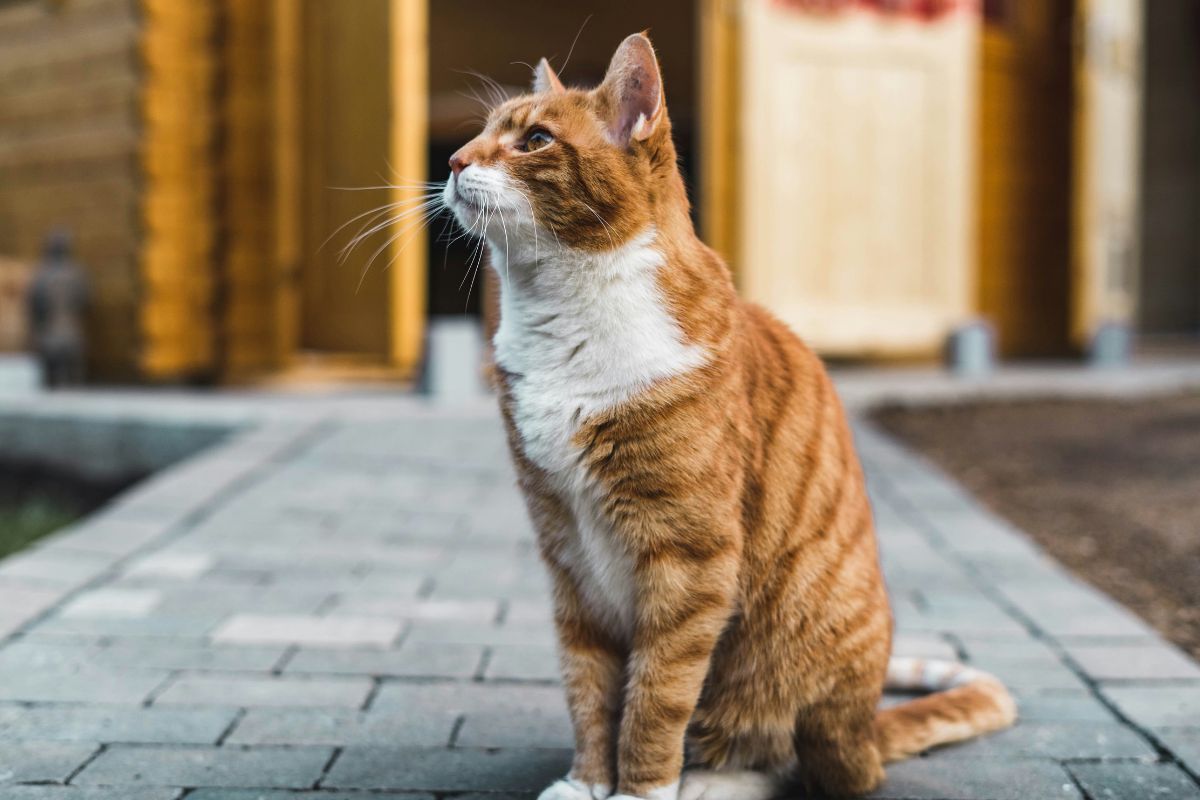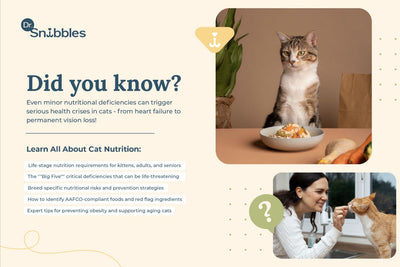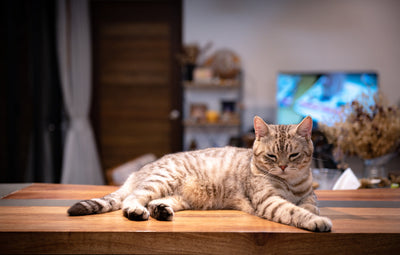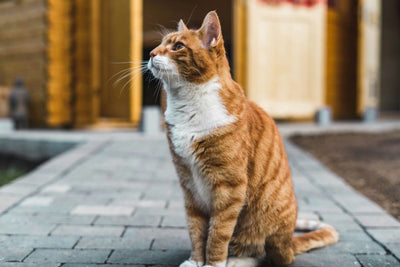Senior Cat Feeding Guide: Daily Meal Plans That Actually Work
As our feline companions enter their golden years, their nutritional needs evolve dramatically. Understanding these changes is crucial for maintaining your senior cat's health, vitality, and quality of life through evidence-based nutrition strategies.
This comprehensive guide explores the science behind senior cat nutrition, helping you make informed decisions that can extend your feline friend's healthy years.

ON THIS PAGE
As your beloved feline companion enters their golden years, their nutritional needs begin to shift in subtle but important ways. Senior cat nutrition becomes more than just switching food brands—it's about understanding how aging affects your cat's body and responding with targeted dietary support. 🎯
Whether you're wondering about the best food for older cats or trying to decode conflicting advice about protein levels, this comprehensive guide will help you navigate your senior cat's changing dietary landscape with confidence.
⏰ When Is Your Cat Considered "Senior"?
Unlike dogs, cats don't show obvious signs of aging until later in life. Most veterinarians consider cats to be seniors around 7-10 years old, but this timeline varies based on several factors:
🏠 Indoor vs. Outdoor Lifestyle:
- Indoor cats: Typically become senior around 8-10 years
- Outdoor cats: May show aging signs as early as 6-7 years due to environmental stressors
🧬 Breed Considerations:
- Mixed breed cats: Generally hardy, senior around 8-9 years
- Purebred cats: Some breeds age faster due to genetic factors
🚨 Key Signs Your Cat May Need Senior Nutrition:
- Decreased activity or longer napping periods 😴
- Changes in appetite or eating habits
- Weight gain or unexplained weight loss ⚖️
- Increased thirst or more frequent urination 💧
- Dental issues affecting eating 🦷
- Dull coat or changes in grooming habits
- Stiffness when jumping or climbing
🥗 Essential Nutritional Changes for Aging Cats
💪 Higher Protein Requirements (Not Lower!)
Myth-busting moment: Contrary to outdated advice, senior cats typically need more protein, not less. Research shows that aging cats are prone to sarcopenia (muscle loss), making high-quality protein essential for maintaining lean muscle mass. ❌➡️✅
🩺 Vet-recommended range: 45-50% protein on a dry matter basis for healthy senior cats
💡 Pro tip for indoor cats: Since indoor seniors are often less active, focus on easily digestible animal proteins like chicken, fish, or turkey to maximize protein utilization without excess calories.
💧 Hydration Support Through Diet
Senior cats are at higher risk for kidney disease and often have a diminished thirst drive. Wet food becomes increasingly important for aging felines. 🥫
Hydration strategies:
- Feed primarily wet food (75% or more of daily calories) 🍽️
- Add water or low-sodium broth to dry kibble
- Consider water fountains to encourage drinking ⛲
- Monitor water bowl levels to track intake 📊
⚖️ Calorie Management for Changing Metabolism
Many senior cats experience a slower metabolism combined with reduced activity, making weight management crucial.
Activity Level Guidelines:
- 🏃 Active seniors: 200-250 calories per day (10-12 lb cat)
- 🚶 Moderately active: 180-220 calories per day
- 😴 Sedentary: 160-200 calories per day
🌟 Key Nutrients for Senior Cat Health
🐟 Omega-3 Fatty Acids (EPA/DHA):
- Support brain health and cognitive function 🧠
- Reduce inflammation in joints
- Promote healthy skin and coat ✨
- Sources: Fish oil, salmon, sardines
🛡️ Antioxidants (Vitamin E, C, Beta-carotene):
- Combat cellular damage from aging
- Support immune system function
- May help maintain cognitive abilities
🔽 Lower Phosphorus (For Kidney Support):
- Reduces burden on aging kidneys
- Important even before kidney disease diagnosis
- Target: 0.3-0.6% phosphorus on dry matter basis
🛒 Choosing the Right Senior Cat Food
🥫 vs 🍪 Wet vs. Dry: The Senior Cat Verdict
For most senior cats, wet food is the clear winner. Here's why:
✅ Benefits of wet food for seniors:
- Higher moisture content supports kidney health 💧
- Easier to chew for cats with dental issues
- More palatable for cats with decreased appetite 😋
- Better portion control for weight management
- Higher protein density
🤔 When dry food might work:
- For cats who strongly prefer kibble
- Mixed feeding approach (wet + small amount of dry)
- Dental-specific formulas for plaque control
💊 Prescription vs. Over-the-Counter
🏥 Consider prescription diets if your cat has:
- Diagnosed kidney disease
- Urinary tract issues
- Diabetes
- Gastrointestinal problems
- Severe dental disease
🛍️ High-quality commercial senior foods work well for:
- Healthy aging cats
- Prevention-focused nutrition
- Cats without diagnosed health issues
🏆 Brand Recommendations Based on Reddit Community Insights
Based on extensive community feedback and veterinary recommendations:
⭐ Top-Rated Senior Cat Foods:
🥇 Royal Canin Aging 12+
- Balanced nutrition for cats 12 and older
- Available in loaf and thin slices in gravy
- Lower phosphorus formulation
- Highly palatable for picky eaters 😸
🥈 Hill's Science Diet Senior
- Clinically proven nutrition 🔬
- Excellent for kidney support
- Available in multiple flavors and textures
🥉 Purina Pro Plan Senior
- High protein content
- Good variety of wet food options
- More budget-friendly than prescription diets 💰
🍽️ For Picky Eaters:
- Tiki Cat mousse varieties (high palatability)
- Weruva grain-free options
- Wellness CORE senior formulas
🤓 Did you know? Many cats develop food preferences that become stronger with age. Having 2-3 approved flavors on rotation can prevent feeding challenges if your cat suddenly rejects their usual food.
🎯 Special Considerations for Senior Cat Feeding
🏥 Managing Multiple Health Conditions
🫘 For cats with kidney disease:
- Prescription renal diets are typically most beneficial
- Lower protein may be necessary (contrary to general senior advice)
- Phosphorus restriction is crucial
- [Related: Understanding Chronic Kidney Disease in Cats]
⚖️ For overweight senior cats:
- Focus on high-protein, moderate-calorie foods
- Increase feeding frequency (3-4 small meals daily) 🕐
- Consider puzzle feeders for mental stimulation 🧩
- [Related: Safe Weight Loss Strategies for Indoor Cats]
⏰ Feeding Schedule Adjustments
Optimal feeding patterns for seniors:
- 2-3 smaller meals instead of one large meal 🍽️➡️🍽️🍽️
- Consistent timing to reduce stress ⏰
- Elevated food bowls for arthritic cats 📈
- Quiet, comfortable eating environment 🤫
💊 Supplements for Senior Cats: What Actually Works

📈 Evidence-based supplements:
🐟 Fish Oil (Omega-3s)
- Dosage: Ask your vet about appropriate amounts 🩺
- Benefits: Joint health, cognitive function, skin/coat
- Quality matters: Choose cat-specific formulations
🦠 Probiotics
- Support digestive health in aging cats
- May help with occasional digestive upset
- Look for multi-strain formulations
🦴 Joint Support (Glucosamine/Chondroitin)
- May benefit cats with arthritis
- More research needed for cats vs. dogs
- Best combined with omega-3s
⚠️ Always consult your veterinarian before adding supplements, especially if your cat takes medications. 💊
🚨 Red Flags: When to Consult Your Vet Immediately
Seek professional guidance if your senior cat experiences:
- 📉 Sudden weight loss (more than 1-2 pounds)
- 🚫 Loss of appetite for more than 24 hours
- 💧 Dramatic increase in thirst or urination
- 🦷 Difficulty chewing or dropping food
- 🤢 Vomiting or diarrhea lasting more than a day
- 🙈 Hiding or behavioral changes
❓ Frequently Asked Questions About Senior Cat Nutrition
❓ When should I switch my cat to senior food?
💬 A: Most veterinarians recommend transitioning around age 7-8 for prevention, or when you notice signs of aging like decreased activity or changes in appetite. There's no harm in starting earlier if your cat enjoys the food. ✅
❓ Do senior cats need more or less protein?
💬 A: Healthy senior cats typically need more high-quality protein to combat muscle loss (sarcopenia). Only cats with diagnosed kidney disease may need protein restriction, and this should be managed by a veterinarian. 💪
❓ Should senior cats eat dry or wet food?
💬 A: Wet food is generally better for senior cats due to higher moisture content, easier chewing, and better portion control. A combination approach (primarily wet with some dry) can work for cats who prefer variety. 🥫>🍪
❓ Is high-protein food bad for cats with kidney disease?
💬 A: For cats with diagnosed kidney disease, protein restriction may be necessary. However, healthy senior cats actually benefit from higher protein. Always consult your vet for cats with kidney concerns. 🩺
❓ What's the best food for a 12-year-old indoor cat?
💬 A: Look for high-protein, moderate-calorie wet foods specifically formulated for seniors. Popular options include Royal Canin Aging 12+, Hill's Science Diet Senior, and Purina Pro Plan Senior. The "best" food depends on your individual cat's preferences and health status. 🏠😺
❓ How can I help my senior cat maintain muscle mass?
💬 A: Feed high-quality animal protein (45-50% on dry matter basis), encourage gentle play and movement, and consider omega-3 supplements. Regular vet checkups help catch muscle loss early. 🏋️♀️
📋 Making the Transition: A Step-by-Step Guide
📅 Week 1-2: Assessment Phase
- Monitor current eating habits and preferences 👀
- Weigh your cat and assess body condition ⚖️
- Note any changes in appetite, energy, or bathroom habits 📝
- Schedule a senior wellness exam if due 🩺
🛒 Week 3: Food Selection
- Choose 2-3 senior food options based on your cat's needs
- Consider wet food as the primary option 🥫
- Buy small quantities initially to test preferences 🛍️
🔄 Week 4-5: Gradual Transition
- Days 1-3: 75% old food, 25% new food
- Days 4-6: 50% old food, 50% new food
- Days 7-10: 25% old food, 75% new food
- Day 10+: 100% new food ✅
📊 Ongoing: Monitor and Adjust
- Weekly weight checks (if possible)
- Watch for digestive upset or appetite changes 👁️
- Adjust portions based on body condition and activity
⚡ Quick Takeaways for Senior Cat Nutrition Success
🥗 Essential nutrition changes:
- Higher protein (45-50% dry matter) for muscle maintenance 💪
- Increased hydration through wet food 💧
- Lower phosphorus for kidney support 🫘
- Omega-3 fatty acids for brain and joint health 🧠🦴
🍽️ Feeding best practices:
- 2-3 smaller meals daily instead of one large meal
- Primarily wet food with occasional dry food treats 🥫>🍪
- Consistent feeding schedule and comfortable environment ⏰
- Elevated bowls for cats with arthritis 📈
🚨 Red flags requiring vet consultation:
- Sudden weight changes (loss or gain over 1-2 pounds) ⚖️
- Appetite loss lasting more than 24 hours 🚫
- Increased thirst or dramatic behavior changes 💧
- Difficulty eating or signs of dental pain 🦷
🏆 Brand recommendations from the community:
- Royal Canin Aging 12+ for balanced senior nutrition 🥇
- Hill's Science Diet for kidney support focus 🥈
- Purina Pro Plan for high-protein options 🥉
- Tiki Cat for palatability in picky eaters 😸
💊 Supplement considerations:
- Fish oil for omega-3s (with vet guidance on dosing) 🐟
- Probiotics for digestive support 🦠
- Joint supplements for arthritic cats 🦴
🌟 Every cat ages differently, and individual needs vary based on health status, activity level, and personal preferences. While these guidelines provide a solid foundation, the best approach is working with your veterinarian to create a tailored nutrition plan that keeps your senior feline healthy, comfortable, and thriving in their golden years. 🐱💝
📞 For personalized advice and health monitoring, schedule regular senior wellness exams with your veterinarian—they're your best partner in ensuring your aging cat receives optimal nutrition throughout their senior years.



